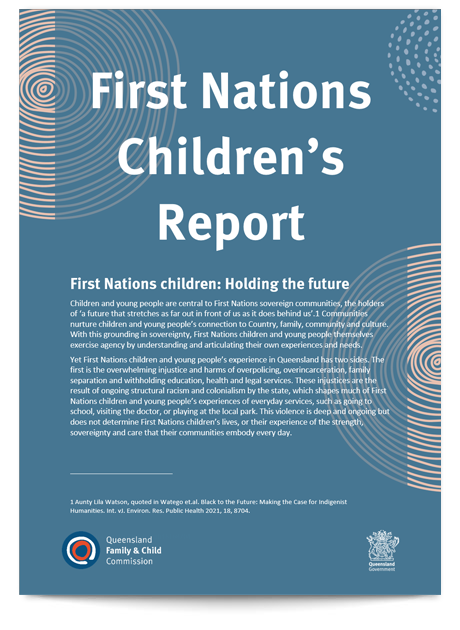
The First Nations Children's Report showcases the stories of Aboriginal and Torres Strait Islander children and families, who are thriving despite the challenges of structural racism and the impacts of colonialism.
First Nations children and young people thrive when they can fully enjoy their right to family, community, culture, and Country. The report demonstrates their strength and resilience and shows the positive outcomes that are possible when their rights are upheld.
The report celebrates stories of strong First Nations children and young people, their families and communities in the areas of health and emotional wellbeing; safety and home environment; learning and skills and economic empowerment; and culture and connection. Hear their stories in the videos below.
We will continue to celebrate First Nations sovereignty and strength by collecting and adding more stories to this website.
Health, mental health and emotional wellbeing
In Mareeba the Mulungu Aboriginal Corporation Primary Health Care Service are keeping First Nations children and young people safe at home with their families and in their communities. Their Family Care Services provide support to pregnant mums ensuring attendance at medical appointments and getting ready to provide a safe and nurturing environment for their new born babies. They provide culturally safe and holistic support that strengthen families, allowing children to form attachments to their parents which is vital for their brain development. This story provides an example of community working closely with families to ensure children are healthy and given the opportunity to develop in the safety of their homes connected to families on Country.
Learning, skills and economic empowerment
Shakoda’s story highlights economic empowerment through the supports she has received during and post schooling. The support of community organisations and teachers has enabled Shakoda to make decisions that are in her best interest as she transitioned from school to further training and into employment. These supports have instilled self-belief that drives her to be a proud deadly young woman in her community. She is a role model to other First Nations young people as she continues to thrive in her culture and community.
The Solid Pathways STEM Program provides support to First Nations children to transition from primary to secondary school influencing senior subject selections and strengthening engagement that leads to increased attainment of Year 12 or equivalent. This story provides an example of First Nations students engaging in critical and creative thinking that supports their aspirations and widens their future opportunities for economic empowerment. These are our future leaders and role models for First Nations children and young people across Queensland.
Culture and connection
Central Queensland Indigenous Development (CQID) delivers a Strong in Family Culture program that ensures that First Nation children and young people in the child protection system in Rockhampton are connected to their culture and family. The program on this day was delivered on Nurim (Mt Archer) with children, families, stakeholders, and Elders. The Elders took the children on a cultural walk and talked about bush medicine and dreamtime stories. The children also got the opportunity to learn some local dances. This story is an example of keeping children and young people connected to their culture and families.
Last updated
22 November 2024

